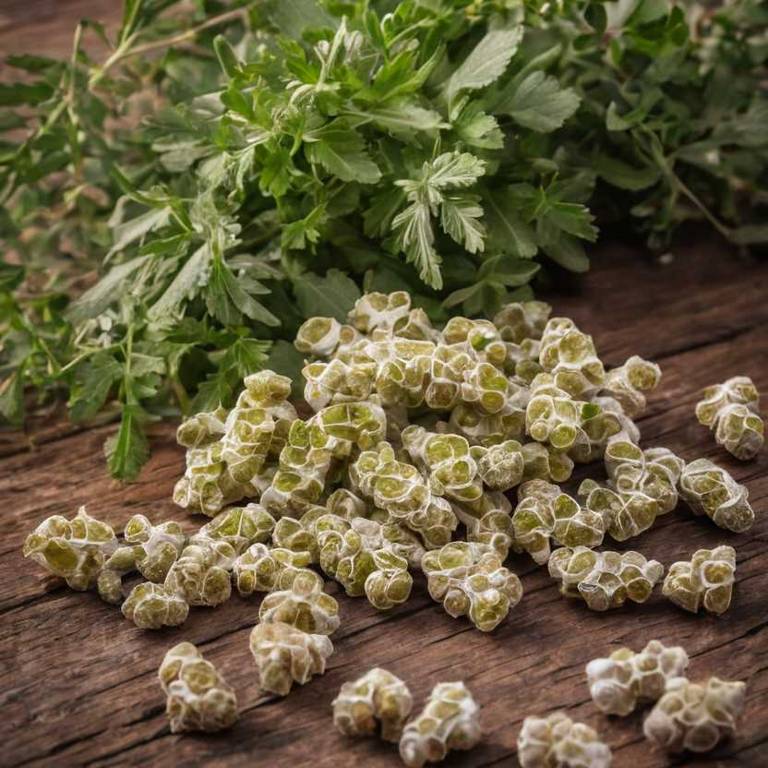Indian Frankincense (Boswellia serrata)
Indian Frankincense (Boswellia serrata) is a member of the Burseraceae family, native to India, Somalia, and Ethiopia. Traditionally, its resin, oleoresin, and bark have been used for decoctions, powders, and infusions.
This herb is particularly valued for its anti-inflammatory, tonic, and bitter actions, and has a long history of use in ayurvedic medicine, unani medicine, and mediterranean herbal traditions.

Quick Facts / Key Information
| Common Name | Indian Frankincense |
|---|---|
| Scientific Name | Boswellia serrata |
| Plant Family | Burseraceae |
| Genus | Boswellia |
| Species | serrata |
| Native Range | India, Somalia, Ethiopia |
| Plant Parts Used | Resin, Oleoresin, Bark |
| Primary Medicinal Actions | Anti-Inflammatory, Tonic, Bitter |
| Primary Traditional Systems | Ayurvedic Medicine, Unani Medicine, Mediterranean Herbal Traditions |
| Historical Preparation Methods | Decoction, Powder, Infusion |
Botanical Identity
- Scientific Name
- Boswellia serrata
- Common Name
- Indian Frankincense
- Synonyms / Alternative Names
- Indian Frankincense, Salai Gum, Frankincense
- Plant Family
- Burseraceae
- Genus
- Boswellia
Botanical Description
- Growth Habit
- Perennial herbaceous plant.
- Height
- It typically reaches a height of 1 to 3 meters.
- Leaves
- Simple leaves with upper surface pale green and lower surface dark green, bearing distinct stomatal bands along the midrib.
- Flowers
- Inflorescences are spike-like clusters with actinomorphic flowers having five white to pale yellow petals and five yellow stamens arranged in two whorls.
- Stems
- Elongated, erect growth habit, opposite branching pattern, smooth surface, presence of resin canals in cross-section.
Traditional Uses / Historical Use
Traditional Systems
- Ayurvedic Medicine
- Unani Medicine
- Mediterranean Herbal Traditions
Historical Preparation Methods
- Decoction
- Powder
- Infusion
- Ointment
Medicinal Actions
- Anti-inflammatory
- Commonly referenced as a warming anti-inflammatory, for general calming applications.
- Tonic
- Traditionally described as a calming tonic, for foundational support.
- Bitter
- As described in traditional systems, a soothing bitter, for digestion-related formulations.
- Carminative
- In herbal texts, considered a mild carminative, within digestive system contexts.
Active Compounds
- Terpenoid
- Plant-produced compounds commonly found in essential oils and resins.
- Flavonoid
- A chemical class commonly identified in plant tissues, especially flowers and leaves.
- Phenolic Acid
- A group of plant-derived compounds frequently identified in herbal material.
- Essential Oil
- Volatile plant-derived substances commonly present in leaves and flowers.
Modern Research Overview
Scientific research related to this plant is ongoing. This section will be expanded in the future to include summaries of phytochemical studies, laboratory research, and other relevant scientific literature as it becomes available.
Safety & Contraindications
- General Precautions
- General precautions have been noted regarding the use of this herb.
- Contraindications
- Available information does not clearly establish contraindications for the use of this herb.
- Allergies
- Reports of allergic reactions to this herb are not well documented in available sources.
- Drug Interactions
- Available information regarding interactions with pharmaceutical drugs is limited.
- Toxicity
- There is insufficient evidence to determine the toxic potential of this herb.
- Pregnancy & Breastfeeding
- There is insufficient evidence to determine the safety of this herb during pregnancy or breastfeeding.
Preparation & Usage Methods
- Infusion
- Infusions are commonly prepared using hot water to release aromatic and soluble components.
- Decoction
- Plant material is simmered in water to extract compounds from tougher parts.
- Poultice
- Fresh or dried plant material is applied externally to the skin.
- Infused Oil
- Oil infusions capture plant compounds using lipid-based solvents.
- Powder
- Powdered preparations use finely milled plant parts.
Growing, Harvesting & Storage
Growing / Cultivation
- Soil
- Prefers loamy soil with well-drained conditions. Typically grows best in organically rich soils.
- Sunlight
- Thrives in partial sun. Tolerates full sun to partial shade.
- Watering
- Prefers well-balanced moisture levels. Tolerates periodic dry conditions.
Medical Disclaimer
The information provided on this page is for educational and informational purposes only. It is not intended to diagnose, treat, cure, or prevent any medical condition. Always consult a qualified healthcare professional before using any herb for medicinal purposes.